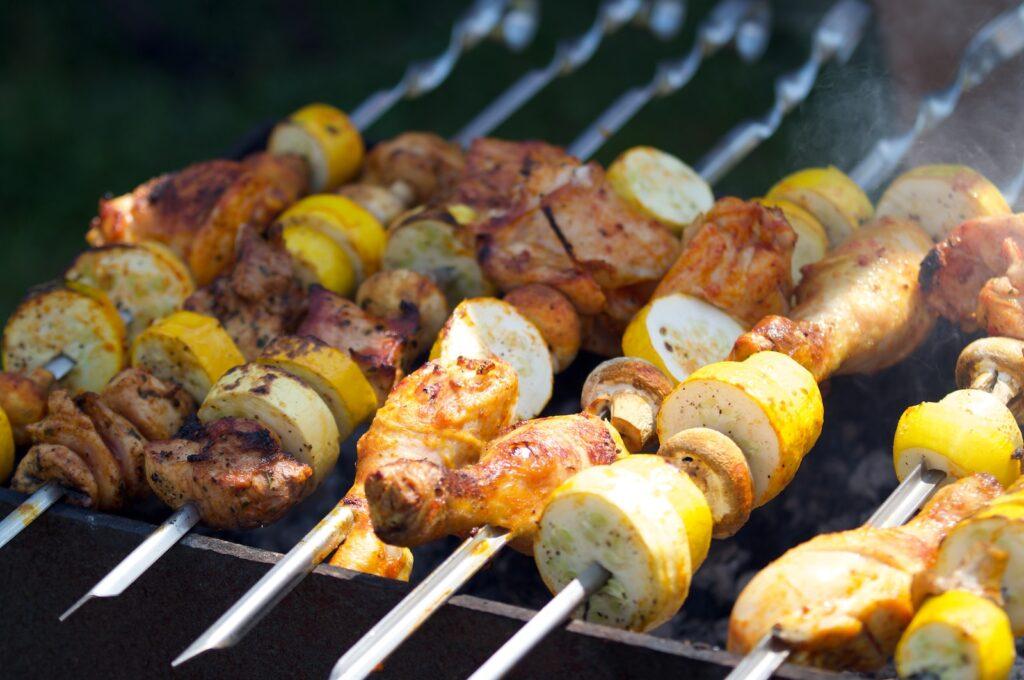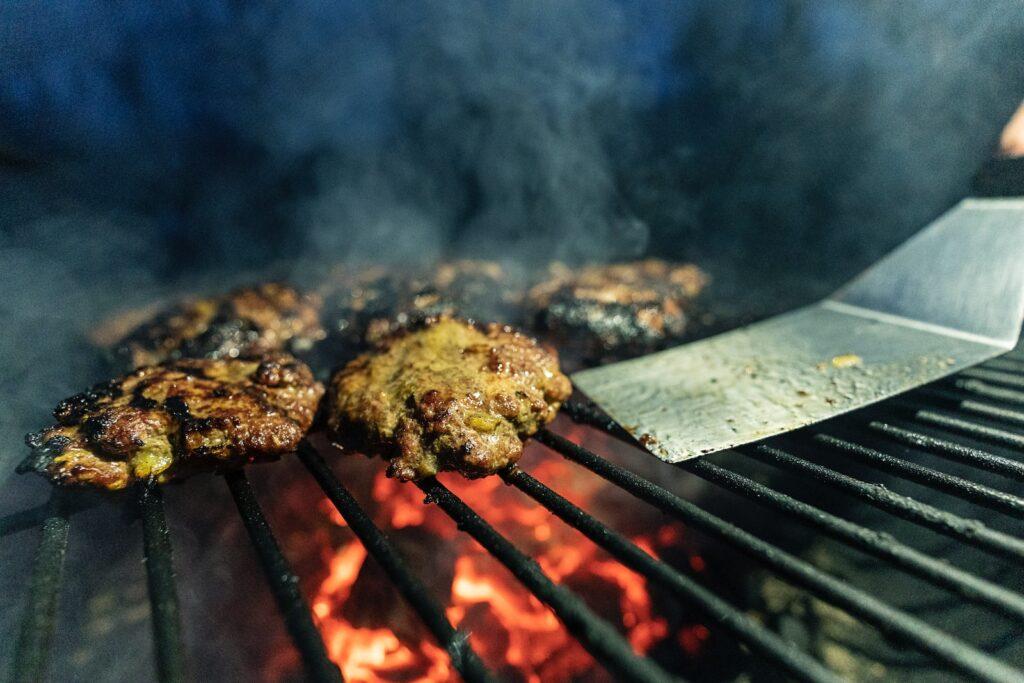Rated & Reviewed is reader-supported. When you buy through links on our site, we may earn an affiliate commission. Learn more.
Grilling is a popular cooking method enjoyed by millions of people around the world. Whether cooking in a backyard, park, or beach, grilling is a classic American pastime. One of the most significant decisions that grillers face is choosing between a gas or charcoal grill. While both grills have advantages and disadvantages, the choice ultimately comes down to personal preference. In this article, we will explore four topics related to gas and charcoal grilling: flavor comparison, temperature control, cost analysis, and environmental impact. By examining each of these topics, we hope to provide you with a thorough understanding of the pros and cons of each grill type, making it easier for you to choose the grill that’s right for you.

Gas vs Charcoal Grills: Flavor Comparison
When it comes to grilling, one of the most important factors is flavor. The smoky taste that comes from cooking over an open flame is what makes barbecuing so popular. However, not all grills are created equal, and the type of grill you use can have a significant impact on the final flavor of your food. In this article, we’ll compare gas and charcoal grills to see how each one impacts the taste and smokiness of the final result.
Gas Grills
Gas grills are known for their convenience and ease of use. They heat up quickly and are ready to cook on in just a few minutes. They also offer precise temperature control, allowing you to easily adjust the heat for different types of cooking. However, when it comes to flavor, gas grills fall short compared to charcoal.
Gas grills don’t produce as much smoke as charcoal grills, which means you won’t get the same smoky flavor in your food. While some gas grills come with smoker boxes designed to add wood chips to the grill for extra flavor, they still can’t match the depth of flavor that comes from cooking over charcoal.
Charcoal Grills
Charcoal grills, on the other hand, are the gold standard when it comes to flavor. Charcoal burns hotter than gas, which means it can create a crusty exterior on your food that locks in flavor and moisture. The high heat also creates a smoky flavor that permeates the entire dish. It’s this flavor that makes charcoal the preferred choice for barbecue enthusiasts.
The downside of using charcoal grills is that they can be more difficult to use than gas grills. They take longer to heat up and require more attention to maintain the right temperature. However, many people feel that the extra effort is worth it for the superior flavor.
When it comes to flavor, charcoal grills have a clear advantage over gas grills. The smoky taste that comes from cooking over charcoal can’t be replicated with gas. However, gas grills have their own advantages, such as convenience and precise temperature control.
Ultimately, the choice between gas and charcoal comes down to personal preference. For those who prioritize flavor above all else, charcoal is the way to go. But for those who value convenience and ease of use, a gas grill might be a better option. Either way, with the right grill and cooking techniques, you can create delicious grilled dishes that are sure to impress.
Gas vs. Charcoal Grills: Temperature Control Capabilities
Temperature control is an essential aspect of grilling, and it directly affects the final result of the food we cook. Gas grills and charcoal grills are the two most popular options for outdoor cooking, and they both have their own unique temperature control capabilities. In this article, we will compare the temperature control features of gas and charcoal grills and discuss how they differ in maintaining consistent heat levels for different cooking techniques, such as searing, indirect grilling, or smoking.
Gas Grill Temperature Control
Gas grills offer excellent temperature control capabilities due to their ability to quickly heat up and maintain consistent heat levels without requiring much attention or effort. They’re powered by propane or natural gas, and the burners create heat that spreads evenly across the cooking surface.
Most gas grills come with a built-in thermometer, allowing you to monitor the internal temperature of the grill. Additionally, many models have multiple burners, allowing you to cook at different heat levels simultaneously. This feature is particularly useful when grilling multiple items that require different temperatures.
Gas grills are ideal for searing meats and vegetables due to their high heat output. However, they often struggle to achieve the low, slow heat required for smoking or indirect grilling.
Charcoal Grill Temperature Control
Charcoal grills are the traditional option for outdoor cooking and offer a different type of temperature control. The heat source comes from burning charcoal that is typically lit with lighter fluid or a chimney starter. The charcoal must reach the proper temperature before food is added to the grill, which can take up to 30 minutes.
Adjusting the temperature on a charcoal grill requires adjusting the air vents. The vents regulate airflow, which controls the temperature of the grill. The more open the vents, the higher the temperature will be. Likewise, closing the vents can lower the temperature.
Charcoal grills are ideal for achieving a slow, low heat required for smoking or indirect grilling. However, it can be challenging to maintain a consistent temperature due to the constant need to adjust the air vents. Additionally, charcoal grills can be challenging to use in inclement weather conditions or windy environments due to the vulnerability of keeping the flame alive.
Whether to choose gas or charcoal grills depends on your personal preferences, the type of cooking, and the situation in which you cook. If you’re looking for quick, easy-to-use, and efficient grilling with excellent temperature control, a gas grill may be your best bet.
But if you prefer a more traditional method of smoking and low-heat grilling with greater flavor but a bit more work, go for a charcoal grill. Ultimately, both types of grills have their own unique benefits and will help you create delicious food with little effort.

Gas vs. Charcoal Grills: Cost Analysis
Choosing between gas and charcoal grills also comes down to cost considerations, which can vary significantly depending on the type of grill and usage.
Upfront Expenses
The cost of purchasing a gas grill is generally higher than that of a charcoal grill. The price of a high-quality gas grill can range from $500 to $1,500 or more, while a charcoal grill can cost between $50 to $500,depending on the size, material, and features.
Fuel Costs
Gas grills tend to be more expensive to operate than charcoal grills. Propane or natural gas, the primary fuel sources for gas grills, is priced per gallon or therm. On average, a gallon of propane can cost between $2 to $4, while natural gas costs vary depending on utility rates. The cost of fuel can add up quickly with frequent use.
Charcoal grill fuel costs also add up, but at a slower rate. Charcoal is relatively inexpensive, costing an average of $20 to $30 for a 20-pound bag, which can last for multiple grilling sessions.
Long-Term Maintenance Expenses
The long-term maintenance expenses of gas and charcoal grills differ significantly due to the design and parts used in each type of grill. Gas grills typically require more maintenance, which can lead to higher costs over time.
Gas grills need regular cleaning and maintenance of burners, grease trays, and ignition systems to ensure they function correctly. These parts wear out over time and require replacement every few years, which can add to the long-term expenses.
Charcoal grills do not require as much maintenance as gas grills since they have fewer parts. However, they can get rusty over time, which may require some cleaning and repainting.
When it comes to cost considerations, charcoal grills are generally more affordable upfront and have lower ongoing fuel costs. Gas grills can be more expensive upfront, require more ongoing fuel costs, and more maintenance, which can add to the long-term expenses. Ultimately, the cost choice comes down to your budget, usage, and preferences.
Gas vs. Charcoal Grills: Environmental Impact
Another factor to consider when choosing between gas and charcoal grills is the environmental impact. Grilling, in general, releases carbon emissions into the atmosphere, which can contribute to greenhouse gas emissions and climate change.
Carbon Emissions
Gas grills are typically considered more environmentally friendly than charcoal grills regarding carbon emissions. Burning propane or natural gas produces less carbon emissions than burning charcoal. Charcoal generates significant greenhouse gas emissions that contribute to atmospheric pollutants and climate change.
Energy Efficiency
Gas grills are generally more energy-efficient than charcoal grills, which can add to their environmental friendliness. Gas grills heat up more quickly and use less fuel to maintain the heat. Charcoal grills, on the other hand, require more fuel and time to reach the desired temperature and can burn through the fuel faster.
Sustainability of Fuel Sources
The sustainability of fuel sources is also an essential consideration when it comes to the environmental impact of grilling. Propane and natural gas are non-renewable fuel sources that contribute to greenhouse gas emissions. However, they are generally considered cleaner burning than charcoal.
Charcoal production requires cutting down trees for lumber, leading to deforestation and soil erosion. Additionally, the production process involves burning wood in a kiln, which releases carbon into the atmosphere.
When considering the environmental impact of grilling, gas grills are typically considered more environmentally friendly than charcoal grills. Gas grills produce fewer carbon emissions and are generally more energy-efficient. However, the sustainability of fuel sources is also an essential consideration. While propane and natural gas are cleaner fuels, they are non-renewable. Charcoal, on the other hand, is produced from wood and contributes to deforestation and soil erosion. Ultimately, the best choice is to minimize the environmental impacts of both gas and charcoal grilling, including choosing efficient and sustainable fuel sources and reducing waste and emissions.
Wrapping It Up
When it comes to outdoor grilling, there are many factors to consider, including flavor, temperature control, cost, and environmental impact. Gas and charcoal grills both have unique features and benefits, making it challenging to decide which one to choose.
Gas grills offer quick and efficient temperature control, ideal for searing and cooking at high temperatures, making them suitable for busy individuals or those looking to produce a large amount of food quickly. On the other hand, charcoal grills offer a more traditional and robust cooking experience, producing more smoky, flavorful, and versatile results suitable for lower heat cooking.
In terms of cost, charcoal grills are generally more affordable, while gas grills are more expensive. Fuel costs between the two types of grills vary, with gas grills typically requiring more fuel costs. Long-term maintenance expenses can also differ, with gas grills requiring more maintenance than charcoal grills.
When it comes to environmental impact, gas grills are usually considered more environmentally friendly than charcoal grills, emitting fewer carbon emissions into the atmosphere. However, the sustainability of fuel sources is also an essential consideration, with propane and natural gas being non-renewable, and charcoal contributing to deforestation and soil erosion.
Ultimately, the choice between gas and charcoal grills comes down to personal preferences, usage, and budget. Both types of grills are ideal for producing delicious and satisfying meals, and by following environmentally-friendly practices, we can minimize our impact on the environment.
FAQs
Which type of grill is better, gas or charcoal?
It depends on your personal preferences, usage, and budget. Gas grills are generally more efficient and require less maintenance, making them suitable for busy individuals and those looking to cook at high temperatures quickly. Charcoal grills, on the other hand, offer a more traditional cooking experience, producing more robust and versatile results.
Are gas grills more expensive than charcoal grills?
Yes, gas grills are generally more expensive than charcoal grills upfront.
Which grill produces better flavor, gas, or charcoal?
This is subjective and debatable. Charcoal grills produce a smokier, more robust flavor, while gas grills offer less smokiness but are more efficient and easier to use for high-temperature cooking.
Amazon and the Amazon logo are trademarks of Amazon.com, Inc, or its affiliates.


